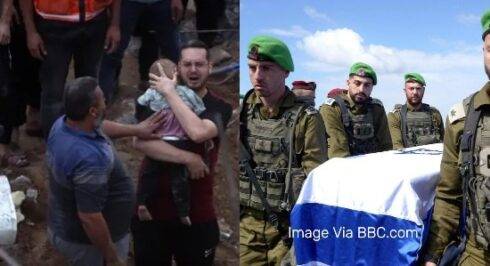On February 20, 2025, Hamas handed over the bodies of four Israeli hostages to Israeli authorities as part of a ceasefire agreement mediated by the International Committee of the Red Cross. The deceased were identified as Shiri Bibas, her two young sons, Ariel and Kfir, and 84-year-old Oded Lifshitz. The Bibas family had been abducted during Hamas’ deadly assault on Israel on October 7, 2023, a day that marked the escalation of the ongoing conflict between Israel and the militant group.
Hamas has claimed that the hostages were killed in Israeli airstrikes on Gaza, a statement that has fueled both outrage and controversy. Israeli authorities, while deeply mourning the victims, have not officially confirmed Hamas’ account of events, and the Israeli military maintains that it did not deliberately target civilians or hostages. The return of the bodies has reignited debates about Israel’s military strategy and Hamas’ tactics, both of which have resulted in significant civilian casualties over the course of the conflict.
Israeli Government Faces Backlash Over Failed Rescue Efforts
The return of the hostages’ remains has sparked widespread mourning and renewed criticism of the Israeli government’s handling of hostage negotiations. In a public statement, Israeli President Isaac Herzog expressed deep sorrow and regret over the loss, acknowledging the state’s failure to secure their safe return. “This is a tragic and painful day for Israel,” Herzog stated, vowing to continue efforts to bring back the remaining captives still held by Hamas.
The incident has intensified scrutiny of Israel’s military strategy, particularly regarding its airstrikes in densely populated areas where hostages may be held. Critics argue that despite Israel’s intelligence capabilities, military operations have often resulted in unintended consequences, including civilian and hostage casualties. The return of the bodies as part of the ceasefire deal has also raised concerns about the safety of other captives, prompting calls for alternative diplomatic approaches to secure their release.
Hamas‘ Role in Civilian Casualties and Hostage Crisis
While Hamas has accused Israel of killing the hostages, its own role in endangering civilian lives cannot be ignored. The militant group has long been criticized for using civilian infrastructure, such as hospitals, schools, and residential buildings, to shield its military operations. This strategy complicates Israeli military responses and increases the risk of collateral damage.
Hamas’ history of using human shields and launching attacks from civilian areas has been well-documented by international organizations. In past conflicts, the group has placed rocket launchers near refugee camps and stored weapons inside civilian facilities, drawing Israeli retaliation. While Hamas portrays itself as a resistance movement, its deliberate endangerment of Palestinian and Israeli civilians has led to widespread condemnation from multiple countries and human rights organizations.
Israeli Airstrikes and Civilian Casualties Spark Global Concern
As Israel continues its military campaign against Hamas, it has faced increasing scrutiny over civilian casualties. While the Israel Defense Forces (IDF) assert that they use advanced precision-strike technology and issue evacuation warnings before attacks, the densely populated nature of Gaza makes avoiding civilian deaths a significant challenge.
In recent months, international organizations have documented multiple Israeli airstrikes that have resulted in high civilian death tolls. In April 2024, a strike on a residential building in Gaza City killed 106 civilians, with Human Rights Watch labeling it a possible war crime due to the lack of a clear military target. Similarly, a December 2024 airstrike in Lebanon killed 49 civilians, raising further concerns about Israel’s military conduct. The attack on the Jabalia refugee camp in October 2023, which killed over 120 people, also led to widespread condemnation.
International Community Calls for Accountability on Both Sides
The ongoing war has placed both Israel and Hamas under international scrutiny. While Israel faces allegations of disproportionate military responses, Hamas continues to violate international law through its use of human shields, indiscriminate rocket attacks on civilians, and the taking of hostages. Reports have also surfaced of Hamas executing Palestinian dissidents and forcibly recruiting child soldiers, further highlighting its brutal tactics.
The latest developments have intensified calls for independent investigations into the conduct of both parties. Human rights organizations stress the need for transparency and adherence to humanitarian law, urging diplomatic negotiations to prevent further loss of innocent lives. While the ceasefire agreement that led to the return of the hostages’ bodies offers a glimmer of hope, the broader conflict remains unresolved, with no clear end in sight.
Table of Contents
Discover more from OGM News NG
Subscribe to get the latest posts sent to your email.














